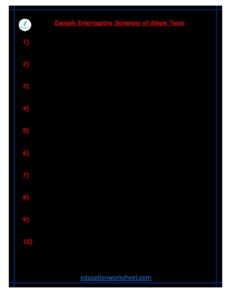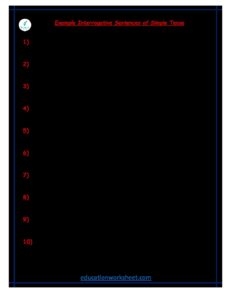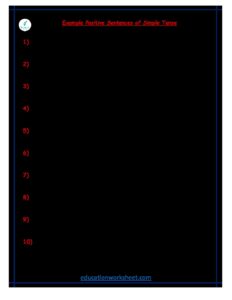Simple Tense examples
Simple Tense examples
Introduction to Simple Tense:
The simple tense is the most basic tense in the English language, and it serves as the foundation for more complex tenses like the present continuous, present perfect, and future tenses. It is primarily used to describe actions or states that are currently happening, habitual actions, general truths, and future events. The simplicity of the simple tense makes it an ideal starting point for anyone learning English, as it forms the basis for more advanced grammar and sentence structures.
Formation of Simple Tense:

In the simple tense, the verb remains in its base form (the infinitive without “to”) for all subjects, except for the third person singular (he, she, it), where you add an “s” to the end of the verb.
- I work at a bank.
- You play the guitar.
- He sings beautifully.
- She dances gracefully.
- It rains in the morning.
Examples of Present Simple Tense:
- I eat breakfast every morning.
- She lives in New York City.
- They study English at the university.
- He likes to read books.
- The sun rises in the east.
- We play football on weekends.
- Cats chase mice.
- Dogs bark loudly.
- The Earth revolves around the sun.
- Birds sing in the morning.
Usage of Simple Tense:

- Habitual Actions: The simple tense is commonly used to describe actions that occur regularly or habitually. For example, “I drink tea every evening.”
- General Truths: It is also used to express general truths or facts, such as, “Water boils at 100 degrees Celsius.”
- Scheduled Events: The simple tense is employed to describe scheduled future events, such as, “The conference starts at 9 AM tomorrow.”
- Permanent Situations: It can be used to describe permanent situations, like, “Mount Everest is the highest peak in the world.”
- Narration: In literature and storytelling, the simple tense can be used for narration or to describe events in the past. For instance, “Once upon a time, in a faraway land, there lives a young prince.”
Examples of Past Simple Tense:
- She visited Paris last summer.
- They watched a movie yesterday.
- I finished my homework a few hours ago.
- He traveled to Japan in 2019.
- We ate dinner at that restaurant last night.
Examples of Future Simple Tense:
- I will call you tomorrow.
- She will graduate next year.
- They are going to visit the museum on Saturday.
- He plans to travel to Europe next summer.
- We’ll meet at the park at 3 PM.
Negative and Interrogative Forms:
The simple tense can also be used in negative and interrogative sentences by adding auxiliary verbs (do/does/did) and “not” to form negatives, or by inverting the subject and auxiliary verb to form questions.
Negative Examples:

- I do not like coffee.
- She does not speak Spanish.
- They did not attend the party.
- He does not drive a car.
- We do not watch TV in the morning.
Interrogative Examples:
- Do you like ice cream?
- Does she play the piano?
- Did they visit London last summer?
- Does he enjoy swimming?
- Do we have a meeting today?
Signal Words:
Signal words are often used in conjunction with the simple tense to indicate its usage. Some common signal words associated with the simple tense include:
- always
- usually
- often
- sometimes
- seldom
- rarely
- never
- every day/week/month/year
- in general
- on Sundays/Mondays, etc.
- once a week/month/year
- regularly
For example, “She usually goes to the gym in the evening.”

